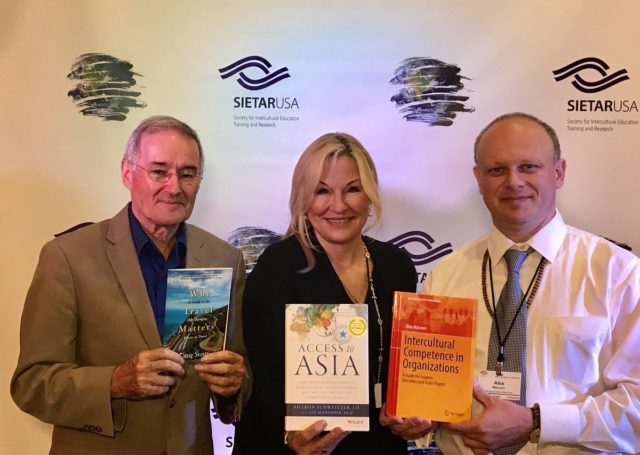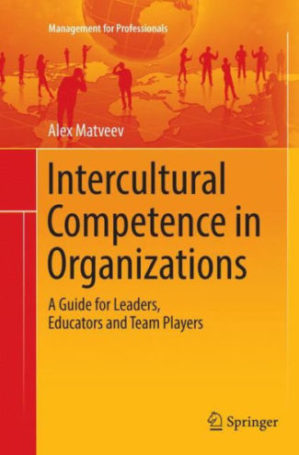
Craig Storti, Sharon Schweitzer, and Alex Matveev by Sietar USA
This 3-part blog series is a book review of Dr. Alex Matveev’s excellent book Intercultural Competence in Organizations. Alex and I met during SIETAR USA in 2017 where we were featured as published authors. We immediately felt a Central-Eastern European bond since he is Russian and I’m part Czech. I ordered his book Intercultural Competence in Organizations on the spot. I’ve used it as a resource for two years. Alex’s work is inspiring and invaluable to our intercultural field so I am sharing some of his wisdom.
In our first blog we summarize Matveev’s definition of Intercultural Competence. We’ll start with an overview of the what and why as well as for whom.
What is Intercultural Competence?
Though cultures have been interacting for millennia, today’s globalized world has increased the speed at which cultures encounter each other. From migration to trade agreements to commercial and leisure travel, the movement of people and their societal values is happening at an ever-increasing rate. These interactions have an impact at every level, from person-to-person, business-to-business and nation-to-nation.
Competence, as Matveev defines it, is an integration of knowledge, personal characteristics and skills that leads to the ability to perform effectively.
Intercultural Competence is the interception of these foundational dimensions:
- Knowledge– information about culture, society, values, beliefs
- Skills– cultural interaction, verbal and non-verbal communication, competent behaviors
- Awareness– critical consciousness, self-reflection, cultural sensitivity
- Attitudes– desire to engage, low ethnocentrism, anticipation of rewards and benefits from cross-cultural interactions
We can attain knowledge and adopt skills through education and experience, but having an awareness and a open-minded attitude takes diligent self-reflection and transformation as well as respect for others.
Why Does Intercultural Competence Matter?
Statistics and research studies covered in Matveev’s book demonstrate that intercultural competence in organizations:
- enhances performance
- aids adjustments to new working environments, and
- positively impacts the company’s bottom line over the long term.
Multicultural teams offer numerous advantages over homogeneous ones, including:
- increased innovation through a wider array of perspectives
- creative problem solving, and
- more effective decision-making.
In a global business environment faced with increasing challenges of recruiting, retention and management the advantages of intercultural competence are unquestionably clear.
In the following blogs we’ll continue to follow Matveev’s research and explore how to measure and implement intercultural competence. We’ll look at academic theories based on empirical data as well as cultural dimensions such as those of Hofstede. We’ll also touch on assessments or inventories that can be conducted for individuals and teams to evaluate levels of cultural competence.
What challenges does your team face with intercultural competence? Drop us a line with your questions and feedback!

Intercultural Competence Book on Amazon
Sharon Schweitzer and Ashley Blake co-wrote this post. Sharon Schweitzer, J.D., is a cross-cultural trainer, attorney, modern manners expert, and the founder of Access to Culture. In addition to her accreditation in intercultural management from the HOFSTEDE Centre and the Intercultural Communication Institute, she serves as a Chinese Ceremonial Dining Etiquette Specialist in the documentary series Confucius was a Foodie, on Nat Geo People. She is the resident etiquette expert on two popular lifestyle shows: ABC Tampa Bay’s Morning Blend and CBS Austin’s We Are Austin. She is regularly quoted by BBC Capital, Investor’s Business Daily, and Fortune. Her Amazon #1 Best Selling book in International Business, Access to Asia: Your Multicultural Business Guide (Wiley 2015), now in its third printing, was named to Kirkus Reviews’ Best Books of 2015. She’s a winner of the British Airways International Trade Award at the 2016 Greater Austin Business Awards and the 2017 New York City Big Book Award for Multicultural Nonfiction.
Ashley Blake is the founder of Traverse Journeys, an impact-based adventure travel provider with a focus on social and environmental responsibility. Ashley holds an MA in Media Studies from the University of Texas at Austin, focusing her research on music for social change in Brazil. Ashley also holds a BA and BS in International Studies and Print Media from Oregon State University with minors in Spanish and Music. Ashley’s academic and professional background merge in her work in project management, consulting, and international tourism. Ashley is a fluent Spanish speaker with basic skills in Portuguese, German and Arabic with experience in more than 40 countries across the globe. Ashley is passionate about connection, communication and coordination in order to link others with the opportunities and experiences that promote personal, professional and community growth.

Leave A Comment